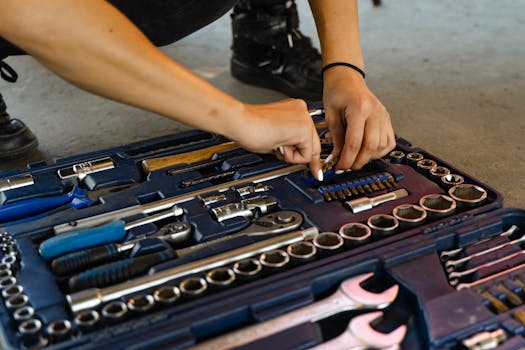
Essential Tools Every Mechanic Should Have in Their Toolbox
Takeaways: A well-equipped toolbox is crucial for any mechanic. Essential tools include a variety of wrenches, sockets, and diagnostic equipment that enhance efficiency and precision in automotive repair. This guide highlights the must-have tools for both novice and experienced mechanics.
When it comes to automotive repair, having the right tools in your toolbox can make all the difference. Whether you’re a professional mechanic or a DIY enthusiast, understanding the essential tools you need is crucial for completing tasks efficiently and effectively. In this article, we will explore the essential tools every mechanic should have in their toolbox to tackle a broad range of tasks, from simple maintenance to complex repairs.
1. Hand Tools

- Wrenches: A complete set of wrenches, including open-end, box-end, and adjustable wrenches, is crucial. They are used for loosening and tightening nuts and bolts.
- Sockets and Ratchets: A socket set paired with a ratchet allows for easier access to fasteners in tight spaces. Ensure your set includes both metric and standard sizes.
- Screwdrivers: A variety of screwdrivers, including flathead and Phillips head, are necessary for tasks involving screws. A magnetic screwdriver can help hold screws in place.
- Pliers: Needle-nose pliers, slip-joint pliers, and locking pliers are essential for gripping, twisting, and cutting wires.
- Hammers: A rubber mallet and a ball-peen hammer can be useful for driving components without damaging them.
2. Power Tools

- Impact Wrench: An impact wrench is invaluable for quickly loosening or tightening lug nuts and bolts. It saves time and effort, especially in tire changes and suspension work.
- Drill/Driver: A cordless drill/driver is essential for drilling holes and driving screws. Look for one with adjustable speed settings and torque control.
- Angle Grinder: An angle grinder can be used for cutting, grinding, and polishing metal parts. It is particularly useful for bodywork and frame repairs.
- Dremel Tool: A versatile rotary tool, a Dremel can be used for detailed work, including sanding, engraving, and cutting small components.
- Air Compressor: An air compressor powers pneumatic tools and can be used for inflating tires and cleaning components. It’s a must-have for any serious mechanic.
3. Diagnostic Tools
In today’s modern vehicles, having diagnostic tools is essential for troubleshooting and repairing electronic systems. These tools can save time and improve accuracy:
- OBD-II Scanner: An OBD-II scanner reads error codes from a vehicle’s onboard diagnostic system, helping you identify issues quickly.
- Multimeter: A multimeter is used to measure voltage, current, and resistance, making it essential for diagnosing electrical problems.
- Compression Tester: This tool helps check the engine’s compression to assess its health, which is critical for diagnosing engine issues.
- Fuel Pressure Gauge: Used to check fuel system pressure, this tool is essential for diagnosing fuel delivery problems.
- Scan Tool: A more advanced diagnostic tool, a scan tool provides in-depth data from various vehicle systems, allowing for comprehensive diagnostics.
Conclusion
Equipping your toolbox with the essential tools discussed in this article will set you up for success as a mechanic. Whether you are performing routine maintenance or tackling more complex repairs, having the right tools on hand is vital. Investing in quality tools not only improves efficiency but also enhances your ability to provide excellent service. Remember, a well-organized toolbox not only saves time but also boosts productivity. Take the time to stock up on these essentials, and you’ll be well on your way to becoming a proficient mechanic.






